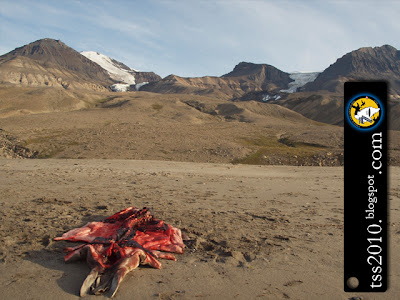It doesn't get any better. Waking up to icebergs has to be one of the best things about camping close to the water in Greenland. At this point I had lost all track of time. The sun turned and burned all day long so long as there was good weather.
The icebergs creaked, groaned, spat and exploded, when they were not sitting impassively in the cool Arctic waters. Mid-morning, afternoon or evening, it was time to get up and go exploring.
The ground around the hunting cabin was littered with organic finds. Whale cartilage ...
... bird skulls and various bones, claws and clumps of melting blubber. Lovely. It was like a smorgasbord of souvenirs, all of which deserved a place in the boat for future enjoyment, most of which stayed on the beach or hidden amongst the grasses.
While previously enjoying the Norwegian and Swedish wilderness areas I have often been tempted to come home with an antler or other "find", but I have never done so. Here, however, bones and "bits" are such commonplace that I did not feel my removing anything would alter anyone's enjoyment of the area. One could imagine that the bones were industrial waste, left behind at the end of a days' work. I was just cleaning up!
The old cabin was a find in itself. With a 180 degree fantastic command of the factory floor, sea and ice, I can see why hunters chose to build here. The beach is ideal for launching kayaks and perfect for dragging whales and seals up onto the sand for butchering. It works well for modern day hunting-motorboats too.
After a few hours of pottering about among the bones I pulled myself together to slip into the water and paddle on along the coast towards the settlement of Qaarsut.
The day was simply stunning. Difficult to find words to describe the peace of paddling over such placid waters. A huge contrast to the stormy weather and waves I associated with my enforced - but enjoyable - stay in Niaqornat.
I spotted something red on a beach along the ways. It looked vaguely human-shaped and I was intrigued. The beach itself looked like a great spot to stretch my legs and demolish a chocolate bar. No shortage of goodies, I was enjoying myself.
The closer I got to the beach the more I thought I would be finding a discarded boiler suit or some such. Closer still, I was excited to find a butchered seal carcass.
Earlier in the expedition I had been counting the number of seal skins I had seen discarded in the water, on the beaches and between the rocks. In my ignorance I thought it was simply waste. During my short lay up in Uummannaq, I found out that seal skins during the summer months are far less valuable than those during the winter. They are worth little to nothing, even if hunters could sell them. The different bans and anti-sealing campaigns around the globe have affected the price of seal skin dramatically. It is not easy to find seals in the water, even with trained eyes it can take a lot of fuel and man-hours to catch enough seals to cover the cost of fuel and equipment. Seal skins have always been a tradeable commodity, but recent policies within EU countries are threatening this industry.
Not being a hunter myself I find it hard to appreciate just how difficult it is to catch a seal and to make a living from it. I do know, however, how tasty seal meat is, fried with blubber in the outdoors, or roasted with a rasher or two of bacon hidden inside. Seeing the seal carcass so cleanly gutted I was impressed by the skill involved. Foxes will enjoy this carcass, gulls and ravens too.
Seals are the free-range cows of the Arctic. Beautiful in the water, basking on the ice and tasty when eaten. A symbolic and revered mammal in Greenlandic waters. Seeing the drawings in the sand and the many different-sized footprints around the carcass, I know a family has enjoyed the excitement of catching this seal and the barbecue that took place when they brought it into land.
As I scared up a huge flock of gulls further down the coast, I wanted to give them a heads up about the feast that awaited them on a remote beach along the Nussuaq Peninsula.






































No comments:
Post a Comment